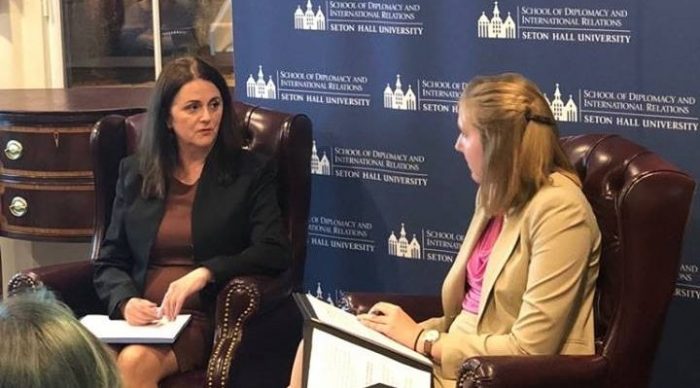Women of Diplomacy Hosts Kosovo Ambassador Teuta Sahatqija
By Madison Feser
Staff Writer
“Excluding one gender is like working with one hand. And if you put one hand [behind your back] and make it unusable, what is the result? The result will be half the work, that’s why need to include women in all decision making institutions.”
With these words, Kosovo Ambassador Teuta Sahatqija encapsulated the message of her presentation, entitled “Leadership Roles of Women in Transitional States.” Her Excellency spoke to the Seton Hall community on November 29, addressing the role of women in the Republic of Kosovo following its declaration of independence from Serbia in 2008.
After an invitation to speak, the Women of Diplomacy Leadership Program (WDLP) was thrilled to hear that the Ambassador wished to address gender equality and women in government. “WDLP always tries to provide a variety of events and we are especially interested when speakers have a desire to speak on women’s leadership,” WDLP president Claire Yocom told the Diplomatic Envoy.
As Sahatqija mentioned in her speech, the School of Diplomacy and International Relations has had a strong relationship with Kosovo since the country’s independence. Additionally, the School of Diplomacy was integral in training the first Kosovo diplomats in the field of international relations.
“The relationship and partnership between Kosovo and the School is strong, and we were thrilled to present to our leaders Ambassador Sahatqija, such a strong example of leadership in a country where leadership is of paramount importance to build awareness, support and recognition,” Associate Dean Elizabeth Halpin told the Envoy.
During her presentation, Sahatqija focused on two major factors that facilitate the advancement of women in political leadership positions: coalition building and adherence to quotas.
“If you want to achieve gender equality, of course you cannot work only with women,” she says. “There are men who do not believe in gender equality, but there are also women…So you need to make coalitions. First, you need to make coalitions with women.”
These coalitions allow women to build what Sahatqija calls a critical mass, a body of women advocating for gender equality despite their political differences. The Cross Party Women’s Caucus of Kosovo allows women to set political animosity aside when advocating for gender equality.
Even Serbian women are no entering the Caucus, despite the “negative energy” between Serbia and Kosovo that Sahatqija says has persisted since the Kosovo war. However, coalitions of women do not have to take place on a state level to be effective.
“WDLP strives to be an organization that builds a coalition around the common cause of empowering and lifting up women to become ambitious and successful professionals,” Halpin wrote. “We have tried to encourage conversation across party lines by hosting Mastermind Group meetings referencing current affairs and trends including the #metoo campaign and the election of President Trump.”
After creating coalitions, such as the Cross Party Women’s Caucus and WDLP, Sahatqija says the next part of the alliance can begin—by bringing together like-minded men. Regarding those who may disagree with gender equality, the Ambassador advises leaving them behind.
“If there are some women and men who don’t think as you, leave them. Invest your energy into people who believe in that [gender equality],” she says, later adding, “If we work together, they cannot crush us.”
Although this is valuable advice, Halpin wished the Ambassador also spoke more on the role on men in achieving gender equality. “Since we had men in the audience as well as women, I would have loved for her to expand on ways that men can be allies in the cause,” she says.
Kira Williams, a student representative from the Stillman School of Business Women’s Leadership Program, told the Envoy that this message of building coalitions of like-minded people was especially important. “The Ambassador’s advocacy of women’s coalitions and work with the Women’s Caucus really resonated with me,” Williams says. “We have to first support ourselves before we are able to support others.”
Dean Halpin had similar feelings regarding the importance of working together to achieve a common goal. She told the Envoy that if audience members took away one message from Sahatqija’s visit, she hopes it would be coalition building.
“We women should think of ourselves as part of a special interest group and form community in the workplace to work together for the progress of all,” Halpin says.
In Kosovo, for a political party to be accredited for a parliamentary election, it must have 30 percent of the less-represented gender—normally women—in its membership. This, of course, raises questions of quality over quantity, and if these quotas promote true gender equality.
Whenever journalists bring this debate to Sahatqija’s attention, she pointedly responds with “do you think 70 percent of men [in parliament] is equality?”
For her, these quotas, like coalitions, provide a critical mass of women in Parliament. They are tools that open opportunities previously denied to women. In analyzing election systems at Dartmouth College, Sahatqija found that in each consecutive election following the implementation of quotas, women get more of their own votes, and won reelections based on those votes, rather than quotas.
After the presentation, Sahatqija spoke to a small group comprised of student media and organizations that sponsored her visit. Prior to leaving, she gave them one last piece of advice.
“To unite women, to achieve gender equality, you must define your goal, make alliances, and make a strategy—make a path. Then you just walk.”
Her Excellency’s visit was sponsored by the Women of Diplomacy Leadership Program and co-sponsored by School of Diplomacy and International Relations, Department of Russian and East European Studies, Business Women’s Leadership Program, Women for Women International, and the Slavic Club.

